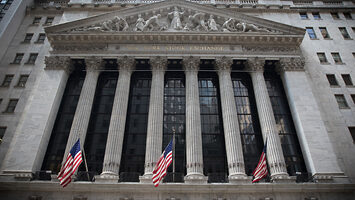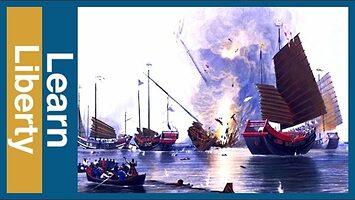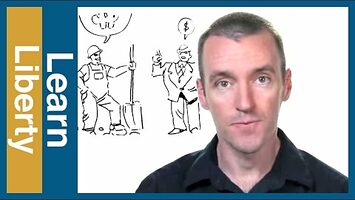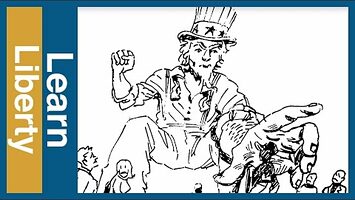Capitalism
Encyclopedia
Capitalism as an economic system is the central feature of economic modernity. No other way of organizing a modern economy has proved successful. Libertarians broadly support and defend it against its critics while arguing for a purer, less compromised version.
Capitalism is a term widely used in contemporary economic and political debate. Originally pejorative, since the 1960s it has become a neutral term, employed by both supporters and critics of the phenomenon it describes. Broadly, capitalism is used to mean an economic system in which the means of production (accumulated assets or capital) are privately owned and in which the use made of those assets in the productive process is determined by the choices made by their owners. A second part of the definition, used more by supporters than critics, is that the choices should be voluntary, as reflected in exchanges and agreements entered into freely. Assuming that owners (those who offer goods and services to others) will generally seek to maximize their return from assets, economic activity will be largely market-driven (i.e., determined by the choices of consumers and producers in a system of free exchange or “market relations”). These relationships generate prices, which act as signals, and the choices made by the owners will, in the main, be responses to those signals.
This widely used and understood definition has a number of problems, however. It is to some extent an “ideal type” that does not reflect the messier and complicated reality. More seriously, it makes capitalism almost a synonym for market economy—that is, for any economic system based on private property and exchange. This near equivalence can be misleading and reflects a lack of understanding of the historicity of both the term and the phenomenon because the word did not come into widespread use until the later 19th century. Capitalism as an economic system is a specific kind of market economy, with certain distinctive features, that came into being during the 19th century and was, arguably, not fully realized until the 1920s.
The actual word capitalism is of comparatively recent origin. Rather surprisingly, Marx never used it in any of his published works and only employed it at all in some of his correspondence toward the end of his life. (He did of course use capital to mean productive resources and did sometimes refer to capitalists, although he more often referred to the bourgeoisie.) According to the Oxford English Dictionary, the first recorded use of the word in print was by William Makepeace Thackeray, in 1854, in his satirical novel, The Newcomes. However, it did not achieve widespread use until the 1890s, and its first extended use as a term of description and analysis came in 1902 in Werner Sombart’s Der Moderne Kapitalismus. It was soon widely adopted, and by the 1920s it had become the normally used term for the status quo challenged by the new socialist system of the Soviet Union and by socialist parties everywhere. Until the 1920s, most people who opposed socialism or proposals for state intervention did not use the word capitalism to describe the kind of economic and social system they advocated. Instead, the term of choice was usually individualism. Capitalism, for authors such as Sombart, was a term of opprobrium, but, as so often happens, it was soon taken up by its targets as a badge of honor. One of the first examples of this was the book, Confessions of a Capitalist, by the English publisher and intellectual activist Sir Ernest Benn in 1925; it was soon followed by others. Even so, many preferred to use such terms as free enterprise or the competitive system; it is only since the 1960s that capitalism has come to be used by both sides of in this process was the publication in 1962 of Milton Friedman’s Capitalism and Freedom, one of the first popular books to employ the term in an unabashedly positive way. Another important landmark was the 1969 collection of essays, Capitalism: The Unknown Ideal, by Ayn Rand and several other authors, including Alan Greenspan.
Since about the 1920s, capitalism has meant—in broad terms—a system that combines private property in the means of production with the shaping of economic activity by market exchange. This usage reflects its origins in the debate between advocates of various kinds of socialism (who argued for doing away with one or both of the two elements) and those who opposed socialism for a variety of reasons. However, this usage is deeply problematic. When not used simply to mean “the way things are,” it makes capitalism the same thing as a market economy, and, indeed, many authors treat the two terms as synonymous. There are two problems with this implication. The first, relatively less important, is that the definition given earlier does not correspond to the actual messy reality of existing modern economic life. In particular, it ignores the frequently prominent role of the state and the ways in which the owners of resources capture and use political power for their own advantage and frequently respond to political signals as much as market ones. This is true, but it does not call into question the usual use of the term as a Weberian ideal type, contrasted to the equally abstract ideal type of socialism or command economy.
The much more serious difficulty is that the contemporary use of capitalism is largely ahistorical. This comment may sound strange given the now extensive historiography, but it is broadly true. If capitalism is the combination of private property and market allocation and thus much the same as market economy, then the problem is to locate it historically. Both private property and markets have existed in almost every period of recorded history; in fact, it is those episodes where one or both have been absent that stand out. The difficulty is that differences between, for example, the medieval or early modern European economy and today’s are so great that to use the same term to describe them both makes that word almost meaningless. Marxists try to avoid this problem by using capitalism as the label for one of the successive stages of economic development in Marx’s schema of history. They argue that primitive communism is followed by ancient economies based on slavery, then by feudalism, based on fealty relations, which in turn is succeeded by capitalism, which is based on market relationships. In each stage, there is a ruling class that controls the dominant factor of production (i.e., slave owners/landowners/capitalists). This schema makes capitalism a discrete stage in economic history. However, the escape is only apparent. Empirical research reveals that markets and privately owned accumulations of productive assets (capital) are found in most times and places, and it becomes almost impossible to give any kind of date to the periodization. Marxist historians, following Marx, have variously located the change from feudalism to capitalism in the 14th, 17th, and 18th centuries. Non-Marxist historians have attempted to distinguish between the industrial capitalism of the modern world and earlier variants, described as agrarian or mercantile capitalism. Again, it proves extremely difficult to locate these forms chronologically and this ambiguity makes capitalism no more than another term for exchange-based economic activity.
The solution to this conundrum, which gives the term capitalism a more precise meaning and also enhances our understanding of the modern world, is to distinguish among the categories of market, market economy, and capitalism. The best example of this kind of analysis is in the monumental three-part work of Fernand Braudel’s Material Civilization and Capitalism. Economic activities that involve trade and exchange have existed throughout human history. However, they are not the only kind of economic activity. There also is the range of phenomena that are economic inasmuch as they involve manipulation of scarce resources to increase wealth, but that do not involve trade, exchange, or money. Such activity belongs to the sphere of domestic or everyday life and is the predominant feature of a subsistence economy, such as that of Carolingian Europe. An economy where trade relations are widespread or even dominant is a market economy. However, the class of market economies or, to put it another way, of market-based economic systems is large and diverse, both in theory and regarding real historical examples. Thus, the mercantile market economy of the classical Islamic world is different from both its ancient predecessor and the modern kind of market economy. In this way of thinking, capitalism is a specific kind of market economy with distinctive features. It also is historically located inasmuch as it appeared in a particular and identifiable time and place.
If all kinds of market economy feature private ownership and exchange, what then are the distinctive features of the capitalist variety? If we look at the modern economy as it has developed, initially in northwestern Europe but latterly more widely, certain institutions are prominent. It is these distinctive and historically specific institutions that define the kind of market economy that came to be called capitalism. The most important is the existence of a market for investment. It is historically common for there to be institutions that allow individuals to invest in an enterprise and so establish a fiduciary claim to a portion of the wealth or income created by that enterprise. In capitalism, these claims (shares or equities) are fully tradable, can be bought and sold like any other commodity, and are traded through sophisticated markets. This process creates a market in investment, which historically has led to much higher levels of investment and accumulation of capital than is the case in other forms of market economy. Closely related to this notion is another distinctive feature of capitalism, the organization of much large-scale production through large firms, which is based on the two principles of limited liability and perpetual succession. Again it is instructive to compare capitalism with the mercantile type of market economy that was predominant before the mid-18th century. There were large firms in medieval and early modern Europe (such as the Medici and the Fugger), but these were essentially large family businesses built around kinship connections and alliances between merchants. In capitalism, the firm increasingly becomes a structured and impersonal organization of the kind described by a number of authors, such as Peter Drucker and Alfred Chandler. These organizations may be run by actual owners/investors, but often it is professional managers who perform this function. The key figure in capitalism, either as a manager or an owner/investor, is the entrepreneur, who notices gaps in the market and by exploiting them both coordinates supply and demand and, more important, drives the process of “creative destruction” or constant innovation, which also is a marked feature of capitalism. The fourth feature of capitalism is mass consumption and production, made possible in part by the increased efficiency that results from the first two features. Finally, hugely important, but little noticed, the predominant part played in labor markets by wage labor constitutes another crucial aspect of capitalism. Historically, while paid employment was common, as opposed to slavery, serfdom, and other forms of unpaid labor, it usually took the form of indentured labor with long-term and highly prescriptive contracts between the employer and employee. Today, it is only highly paid professional athletes and entertainers whose work is organized in this way—European soccer players and American motion picture actors being prominent examples.
The capitalist form of market economy first developed in northwestern Europe between about 1720 and 1860. It grew out of the preexisting mercantile market economy, which was in a process of gradual change, but that nevertheless eventuated in a radical transformation of several existing economic institutions. Two crucial aspects were the appearance of capital markets from the 1690s onward and the emergence of the modern corporation after the 1720s and especially after passage of the British Companies Act in 1862. These changes were possible because of the earlier period of European history, which produced a range of institutions that favored economic innovation, saving, investment, and, above all, secure and enforceable property rights and a rule of law that bound and limited political power. However, the transition from a mercantile market economy to a capitalist one was not inevitable, and we should not think of the modern economy as a goal toward which all earlier European history was directed. Such a transition had not occurred in other market-based economies such as China’s, and one critical factor seems to have been Europe’s continued political division in the face of several attempts by particular states to establish themselves as the predominant power. This political division led to competition among states, including institutional competition, and prevented one power from checking economic change, as happened in China.
One thesis, which has recently enjoyed a renewed popularity, holds that the emergence of capitalism involved a truly radical break with all previous social systems. This argument, which derives ultimately from Karl Polanyi’s The Great Transformation, consists of two elements. The first is the claim that, before the late 18th century, the role of trade or exchange relationships (i.e., of markets) was limited, with all market exchange being “embedded in” (i.e., subordinate to) other kinds of social relations. In particular, this theory argues, land and labor were not freely traded commodities. Empirical research shows that this assumption is clearly untrue. As I have already indicated, markets and exchange relations have been a central feature of most of the world’s cultures and civilizations for most of recorded history. Free exchange in both land and labor can be found in medieval England and the Low Countries, as well as in other parts of the world, such as Song China (960–1279 A.D.). The second claim is that the rise of a capitalist economy involved the appearance of a new kind of human rationality, of a way of thinking about and perceiving the world that had not existed before. According to this way of thinking, European society before the late 18th century (and by extension other societies elsewhere in the world) did not employ “economic rationality” and thought rather in terms of a “moral economy” dominated by noneconomic considerations. Again, this idea is contradicted by empirical research that suggests rather that people before the 19th century were more, rather than less, concerned with economic calculation. The novelty of the capitalist type of market economy should not lead us to exaggerate that novelty nor to believe that it somehow burst on the scene fully formed.
In general, libertarians are strongly supportive of capitalism. They hold this view in part because they see capitalism as superior to any of the alternatives on offer, but their support is more positive than simply regarding capitalism as “the worst system, apart from all the others.” Libertarians regard modern capitalism as an essential or necessary condition of both liberty and a good life. They also argue that it is a virtuous and morally defensible economic system that articulates a body of moral values or virtues every bit as coherent and admirable as any other one. Some libertarians see support for a capitalist system as the necessary consequence of certain given axiomatic beliefs, such as the existence of a body of inherent natural rights. Others prefer to emphasize the beneficial consequences of capitalism. The most obvious is the remarkable increase in practical knowledge and wealth that has occurred since capitalism first appeared. Apart from leading to a huge improvement in the quality of life for ordinary people, capitalism has produced clear benefits where liberty is concerned. It greatly increases the capacity or agency of individuals, that is, their ability to realize goals. Along with other factors, such as increased mobility and the wider diffusion of knowledge, it also increases the range of options or life choices open to people who 300 years ago would generally have had their lives determined for them at birth. Capitalism also is associated with other changes in the modern world that libertarians welcome, above all the demise of slavery and other kinds of unfree labor, the emancipation of women, and the privatization of religious belief.
Despite these positive changes, there is a minority tradition within libertarian thinking that, while favoring capitalism over alternatives such as socialism or fascism, is critical of many features of actually existing capitalist economies. Almost all libertarians are hostile to the idea of a mixed economy and are highly critical of the often incestuous relationship between large firms and political power. Existing capitalism is criticized by contrasting it to an ideal type of pure laissez-faire. Some go further, however, and are critical of important features of capitalist economies that the more “mainstream” libertarians support. There is a persistent critique of the corporate form of business organization and some of its main features such as limited liability. Self-employment is often seen as superior to wage labor, and the growth of the latter is deprecated. The institution of intellectual property has attracted much criticism from libertarians over the years as a form of unjustified monopoly or privilege, and this line of argument is gaining support. There also is a strong undercurrent of hostility to the managerial class that has emerged as a key part of capitalism. Radical libertarians of this sort tend to advocate a different kind of market economy, one not dominated by large business organizations and with much less wage labor.
Further Readings
Bastiat, Frédéric. Selected Essays on Political Economy. Irvington-on-Hudson, NY: Foundation for Economic Education, 1995.
Benn, Sir Ernest. Confessions of a Capitalist. London: Hutchinson, 1925.
Braudel, Fernand. Material Civilization and Capitalism. Baltimore: Johns Hopkins University Press, 1977.
Drucker, Peter F. Concept of the Corporation. New Brunswick, NJ: Transaction, 1993.
Friedman, Milton. Capitalism and Freedom. Chicago: University of Chicago Press, 2002.
Hayek, F. A. The Road to Serfdom. Chicago: University of Chicago Press, 1994.
Keayne, Robert. The Apologia of Robert Keayne. Bernard Bailyn, ed. New York: Harper & Row, 1965.
Polanyi, Karl. The Great Transformation. New York: Octagon Books, 1975.
Rand, Ayn. Capitalism: The Unknown Ideal. New York: Penguin/Putnam, 1986.
Smith, Adam. The Wealth of Nations. Indianapolis, IN: Liberty Fund, 1981.

















